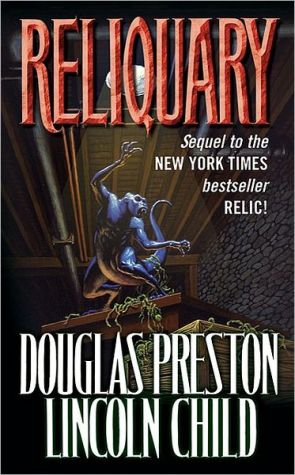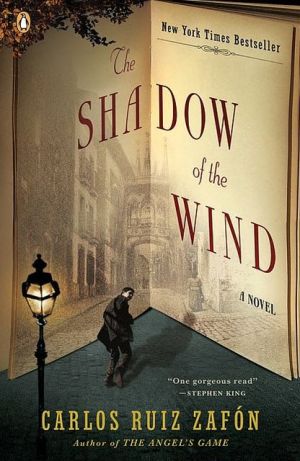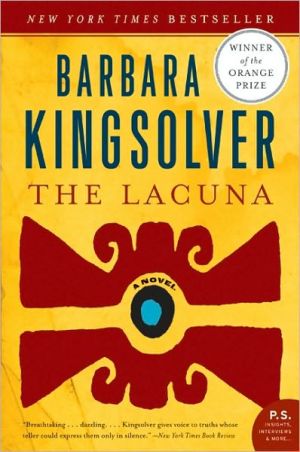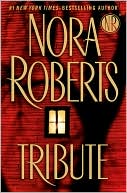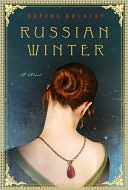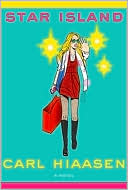Reliquary (Special Agent Pendergast Series #2)
When police divers find two skeletons locked in a bony embrace deep in the mud off the Manhattan shoreline, Natural History Museum curator Margo Green is called in to aid in the investigation. However, she soon learns that she is needed for more than just her anthropological expertise. The authorities also want her for reasons she has been struggling to forget: her experience the prior year, battling a horrific beast loose in the basement corridors of the Museum. The mystery of the skeletons...
Search in google:
When police find two skeletons locked in a bony embrace deep in the mud off the Manhattan shoreline, Natural History Museum curator Margo Green is called in to aid in the investigation. She soon realizes that the expertise the cops want is the result of her ordeal last year, battling the horrific beast loose in the basement corridors of the Museum. Because the skeletons show signs, not only of foul play, but of abnormalities point to thing: the awakening of a slumbering nightmare. Aided by Lieutenant D'Agosta, the enigmatic FBI agent Pendergast, and the brilliant scientist Dr. Frock, the search for answers will take Margo and her team far beneath the city of Manhattan, into an underworld few know exist - and fewer still would dare to go.Publishers WeeklyThe netherworld of New York Cityits subways, aqueducts, sewers and the homeless who inhabit themproves as shuddery a setting for the authors' latest scientific monster mash as the American Museum of Natural History did for their bestselling Relic, to which this is the sequel. In the earlier novel, Mbwun, a ferocious creature that seemed part reptile, part human, rampaged through the museum killing people. The sequel, set 18 months after Mbwun was destroyed, opens with a police diver finding the headless bodies of two people apparently killed by underground cannibals. The corpses are sent to the museum's lab for analysis, which brings a number of returnees from Relicburly homicide cop Vincent D'Agosta, anthropologist Margo Green, New York Post crime reporter Bill Smithbackto the case. They're soon joined by the novels' Sherlock Holmes figure, the irresistibly cool Special Agent Pendergast of the FBI. Forays by these principals into the kingdom of the Mole People (underground homeless), plus some forensic breakthroughs, point to a race of mini-Mbwun at work in an escalating series of savage killings that incite the city's upper crust to civil disobedience. The city's answer, to flood its nether vaults, turns out to threaten a global catastrophe that only Pendergast and company, aided by Navy SEALS, can avert. The story's "surprise" ending makes as much sense as ketchup on popcorn, and the entire novel has a desperate air about it as the authors stuff it with complications and, by pitting the homeless against the swells, try to create a kind of Decapitation of the Vanities. It's high on suspense and tremendous fun in parts, though, especially when exploring the city's nightmare underbelly. Literary Guild and Doubleday Book Club alternate selections. (May)
1\ Snow tested his regulator, checked both air valves, ran his hands along the slick neoprene of the suit. Everything was in order, just as it had been when he last checked it, sixty seconds before.\ "Another five minutes," the Dive Sergeant said, cutting the launch to half speed.\ "Great," came the sarcastic voice of Fernandez over the sound of the big diesel. "Just great."\ Nobody else spoke. Already, Snow had noticed that small talk seemed to die away when the team neared a site.\ He looked back over the stern, watching the froth of the Harlem River spread out behind the propeller in a brown wedge. The river was wide here, rolling sluggishly under the hot gray haze of the August morning. He turned his gaze to ward the shore, grimacing slightly as the rubber cowl pulled at the skin of his neck. Towering apartment buildings with broken windows. Ghostly shells of warehouses and factories. An abandoned playground. No, not quite abandoned: one child, swinging from a rusty frame.\ "Hey, Divemaster," Fernandez's voice called to him. "Be sure you got your training diapers on."\ Snow tugged at the ends of his gloves and continued looking toward the shore.\ "Last time we let a virgin out on a dive like this," Fernandez continued, "he shit his suit. Christ, what a mess. We made him sit on the transom all the way back to base. And that was off Liberty Island, too. A frigging cakewalk compared to the Cloaca."\ "Fernandez, shut up," the Sergeant said mildly.\ Snow continued to gaze over the stern. When he'd come to Scuba from regular NYPD, he had made one big mistake: mentioning that he'd once worked a Sea of Cortez dive boat. Too late, he'd learned that several of the Scuba team had at one time been commercial divers laying cable, maintaining pipelines, working oil platforms. To them, divemasters like him were pampered, underskilled wimps who liked clear water and clean sand. Fernandez, in particular, wouldn't let him for get.\ The boat leaned heavily to starboard as the Sergeant angled in closer to shore. He cut the power even further as they approached a thick cluster of riverfront projects. Suddenly, small, brick-lined tunnel came into view, breaking the monotony of the gray concrete facades. The Sergeant nosed the boat through the tunnel and out into the half-light beyond. Snow became aware of an indescribable smell wafting up from the disturbed waters. Tears sprang involuntarily to his eyes, and he stifled a cough. In the bow, Fernandez looked back, sniggering. Beneath Fernandez's open suit, Snow could see a shirt with the Police Scuba team's unofficial motto: We dive in shit and look for dead things. Only this time it wasn't a dead thing, but a massive wrapped brick of heroin, thrown off the Humboldt Rail Bridge during a Shootout with police the previous night.\ The narrow canal was lined on both sides by concrete embankments. Ahead, a police launch was waiting beneath the railroad bridge, engine off, bobbing slightly in the striped shadows. Snow could see two people on board: the pilot and a heavyset man in a badly fitted polyester suit. He was balding and a wet cigar projected from his lips. He hiked up his pants, spat into the creek, and raised one hand toward them in greeting.\ The Sergeant nodded toward the launch. "Look who's here."\ "Lieutenant D'Agosta," one of the divers in the bow replied. "Must be bad."\ "Anytime a cop is shot, it's bad," said the Sergeant.\ The Sergeant killed the engine, swinging the stern around so the two launches drifted together. D'Agosta stepped back to speak with the dive team. As he moved, the police launch heeled over slightly under his shifting weight, and Snow could see that the water left an oily, greenish residue on the hull as it slid away.\ "Morning," D'Agosta said. Normally ruddy-faced, in the darkness beneath the bridge the Lieutenant blinked back at them like a pale cave creature that shunned the light.\ "Talk to me, sir," the Dive Sergeant replied, strapping a depth gauge to his wrist. "What's the deal?"\ "The bust went bad," D'Agosta said. "Turns out it was just a messenger boy. He tossed the stuff off that bridge." He nodded upward toward the overhanging structure. "Then he shot up a cop and got his own ass aired out good. If we can find the brick, we can close this piece-of-shit case."\ The Dive Sergeant sighed. "If the guy was killed, why call us out?"\ D'Agosta shook his head. "What, you just gonna leave a six-hundred-grand brick of heroin down there?"\ Snow looked up. Between the blackened girders of the bridge, he could see the burnt facades of buildings. A thousand dirty windows stared down at the dead river. Too bad, he thought, the messenger had to throw it into the Humboldt Kill, aka Cloaca Maxima, named after the great central sewer of ancient Rome. The Cloaca was so called because of its centuries-old accumulation of shit, toxic sludge, dead animals, and PCBs. A subway lumbered by above, shuddering and screeching. Beneath his feet the boat quivered, and the surface of the glistening thick water seemed to jiggle slightly, like gelatin that had begun to set.\ "Okay, men," he heard the Sergeant say. "Let's get wet."\ Snow busied himself with his suit. He knew he was a first-rate diver. Growing up in Portsmouth, practically living in the Piscataqua River, he'd saved a couple of lives over the years. Later, in the Sea of Cortez, he'd hunted shark, done technical diving below two hundred feet. Even so, he wasn't looking forward to this particular dip.\ Though Snow had never been near it before, the team talked about the Cloaca often enough back at the base. Of all the foul places to dive in New York City, the Cloaca was the worst: worse than the Arthur Kill, Hell Gate, even the Gowanus Canal. Once, he'd heard, it had been a sizeable tributary of the Hudson, cutting through Manhattan just south of Harlem's Sugar Hill. But centuries of sewage, commercial construction, and neglect had turned it into a stagnant, unmoving ribbon of filth: a liquid trash can for everything imaginable.\ Snow waited his turn to retrieve his oxygen tanks from the stainless-steel rack, then stepped toward the stern, shrugging them over his shoulders. He still was not used to the heavy, constricting feel of the dry suit. Out of the corner of his eye, he could see the Sergeant approaching.\ "All set?" came the quiet baritone.\ "I think so, sir," Snow said. "What about the headlamps?"\ The Sergeant stared at him blankly.\ "These buildings cut out all the sunlight. We'll need lamps if we're going to see anything, right?"\ The Sergeant grinned. "It wouldn't make any difference. The Cloaca's about twenty feet deep. Below that, there's ten, maybe fifteen feet of suspended silt. As soon as your flippers touch that silt, it balloons out like a dustbomb. You won't be able to see beyond your visor. Below the silt is thirty feet of mud. The brick'll be buried somewhere in that mud. Down there, you see with your hands."\ He looked at Snow appraisingly, hesitating a moment. "Listen," he said in a low voice. "This won't be like those practice dives in the Hudson. I only brought you along because Cooney and Schultz are still in the hospital."\ Snow nodded. The two divers each had gotten a case of the "blastos"—blastomycosis, a fungal infection that attacked the solid organs—while searching for a bullet-ridden body in a limo at the bottom of the North River the week before. Even with mandatory weekly blood work to screen for parasites, bizarre diseases ruined the health of divers every year.\ "If you'd rather sit this one out, it's okay," the Sergeant continued. "You can stay here on deck, help with the guide ropes."\ Snow looked over at the other divers as they strapped on their weight belts, snugged the zippers of their dry suits tight, let the lines over the sides. He remembered the first rule of the Scuba team: Every man dives. Fernandez, making a line fast to a cleat, looked back toward them and smirked knowingly.\ "I'm diving, sir," Snow said.\ The Sergeant stared at him for another long moment. "Remember basic training. Pace yourself. First time down in that muck, divers have a tendency to hold their breath. Don't do it; that's the fastest way to an embolism. Don't overinflate your suit. And, for Christ's sake, don't let go of the rope. In the mud, you forget which way is up. Lose the rope, and the next body we come looking for will be yours."\ He pointed to the sternmost guide rope. "That'll be you."\ Snow waited, slowing his breathing, while the mask was slipped over his head and the lines attached. Then, after a final check, he went over the side.\ Even through the stifling, constrictive dry suit, the water felt strange. Viscous and syrupy, it didn't rush past his ears or eddy between his fingers. Pushing against it was an effort, like swimming in crankcase oil.\ Tightening his grip on the guide rope, he allowed himself to sink a few feet below the surface. Already the keel of the launch was invisible overhead, swallowed by a miasma of tiny particles that filled the fluid around him. He looked around through the feeble, greenish light. Immediately in front of his face, he could see his gloved hand gripping the rope. At a greater distance, he could make out his other hand, outstretched, probing the water. An infinity of motes hung in the space between. He could not see below his feet: there was only blackness. Twenty feet down into that blackness, he knew, lay the ceiling of a different world: a world of thick, encasing mud.\ For the first time in his life, Snow realized just how much he had depended on sunlight and clean water for his sense of security. Even at fifty meters down, the waters in the Sea of Cortez had been clear; light from his torch had given a sense of openness and space. He let himself drop another several feet, eyes straining into the blackness below.\ Suddenly, at the outermost reaches of his vision, he saw or thought he saw through the dim currents a solid haze beneath him, an undulating, veined surface. It was the layer of silt. He sank toward it slowly, feeling a knot of apprehension grow in his stomach. The Sergeant had said that divers often imagined they saw odd things in the thick waters. It was sometimes hard to tell what was real and what was not.\ His foot touched the strange floating surface—passed through it—and instantaneously a cloud roiled out, folding around him, shutting out all sight. Snow panicked for an instant, scrabbling at the guide rope. Steadying himself with the thought of sniggering Fernandez, he descended. Each movement sent a new storm of black liquid eddying against his visor. He found himself instinctively holding his breath against it, and he forced himself to breathe long, regular breaths. This is bullshit, he thought. My first real dive on the force, and I'm practically a basket case. He stopped for a moment, controlling his breathing, forcing it back into a steady rhythm.\ He let himself down the rope a few feet at a time, moving sparingly, trying to relax. With some surprise, he realized that it no longer mattered whether his eyes were open or shut. His mind kept returning to the thick mantle of mud that waited beneath him. Things were in that mud, encased, like insects in amber…\ Suddenly, his boots seemed to touch bottom. But it was unlike any seabed Snow had felt before. This bottom seemed to be decomposing; it yielded beneath his weight with a disgusting kind of rubbery resistance, sneaking up his ankles, then his knees, then his chest, like sinking into clammy quick-sand. In a moment it was over his head, and he was beneath it and still descending, slower now, encased wholly in an ooze that could not be seen but only felt, pushing close against the neoprene of his dry suit. He could hear the bubbles of his own exhalations working their way upwards around him; not with the quick abandon he was used to, but instead with a slow flatulent rolling. The mud seemed to offer more resistance as he descended. How far down was he supposed to go in this shit?\ He swung his free hand about as he had been taught, sweeping it through the muck. It bumped into things. In the blackness with his thick gloves it was hard to tell what they were limbs of trees, crankshafts, nasty snarls of wire, the collected waste of centuries trapped in this graveyard of mud.\ Another ten feet, and he'd go back up. Even that bastard Fernandez couldn't snigger after this.\ Abruptly, his swinging arm bumped against something. When Snow pulled at it, the thing drifted toward him with the kind of slow resistance that implied weight. Snow tucked the guide rope around the crook of his right arm and felt the thing. Whatever it was, it was not a brick of heroin. He let it go, pushing himself away.\ The thing swung around in the treacly eddy of his flippers and bumped up against him in the blackness, knocking his visor back and momentarily loosening his regulator. Regaining his balance, Snow began moving his hand over the object, looking for a hold with which to push it away.\ It was like reaching into a tangle of something. A large tree branch, maybe. But it was inexplicably soft in places. He felt A human skeleton. He tried again to slow his breathing, get his mind working properly. Common sense and training told him he couldn't just leave it there. He'd have to bring it up.\ He began threading the guide rope through the hip joint and down around the long bones as best he could in the thick muck. He figured there was still enough gristle on the bones to hold the thing together on its trip to the surface. Snow had never tried to tie a knot with gloved fingers in pitch-black mud before. This was something the Sergeant hadn't gone into during Basic.\ He hadn't found the heroin. But it was still a stroke of luck: Snow had stumbled onto something important. An unsolved murder, perhaps. Muscle-bound Fernandez would shit a brick when he found out.\ Yet, somehow, Snow felt no exhilaration. All he wanted was to get the hell up and out of this mud.\ His breath was coming in quick, short pants, and he no longer made any effort to control it. His suit was cold, but he couldn't stop to inflate it now. The rope slipped and he tried again, holding the skeleton close to him in the ooze to make sure it didn't slip away. Again and again he thought of the yards of mud above his head, the whirlpool of silt above that, the viscous water through which sunlight never penetrated…\ The rope pulled tight at last and he gave a mental whimper of thanks. He'd just make sure it was secure, then give three tugs on the line, signaling he'd found something. And then he'd climb up the line and out of this black horror, onto the boat and onto dry land, and maybe then he'd shower for ninety minutes, get drunk, and think about getting his old job back. Dive boat season was just a month away. He checked the rope, feeling it tight around the corpse's long bones. His hands moved up, probing for the ribs, the sternum, threading more rope through the bones, ensuring the fit was snug and that the rope would not slip off when they hauled it topside. His fingers continued to travel upward, only to find that the spinal column tapered off into nothing but black muck.\ No head. Instinctively Snow jerked his hand away, then realized in a surge of panic that he had let go of the guide rope. He windmilled his arms and bumped against something: the skeleton again. He grabbed at it desperately, almost hugging it with relief. He quickly felt downward for the rope, grasping and feeling along the long bones, trying to remember just where he'd tied it.\ The rope wasn't there. Had it come loose? No, that was impossible. He tried to shove it, to turn it, looking for the rope, and suddenly felt his air hose catch on something. He jerked back, disoriented again, and felt the seal on his mask loosening. Something warm and thick began trickling underneath. He tried to shake loose and felt his mask pulled aside, a surge of mud flooding his eyes, oozing into his nose, sucking across his left ear. With escalating horror he realized that he was tangled in a macabre embrace with a second skeleton. And then came blind, mindless, screaming panic.\ • • •\ On the deck of the police launch, Lieutenant D'Agosta watched with detached interest as the novice diver was hauled to the surface. He was a remarkable sight: thrashing around, bubbling yells partly muffled by mud, streams of the ochre-colored stuff bleeding away from his dry suit and staining the water chocolate. The diver must've lost his hold on the rope at some point; he was lucky, very lucky, to have found his way back to the surface. D'Agosta waited patiently while the hysterical diver was brought on board, unsuited, rinsed off, and calmed down. He watched the man vomit over the side—not on deck, D'Agosta noted approvingly. He'd found a skeleton. Two of them, apparently. Not what he'd been sent down for, of course, but not bad, for a virgin dive. He would write the poor guy a commendation. The kid would probably be okay if he hadn't breathed in any of that shit that clung to his nose and mouth. If he had…well, it was miraculous what they could do with antibiotics these days.\ The first skeleton, when it appeared at the churning surface, was still coated with sludge. A sidestroking diver dragged it to the side of D'Agosta's launch, eased a net around it, and clambered onto the deck. It was hoisted up the side, scraping and dribbling, sliding onto a tarp at D'Agosta's feet like some grisly catch.\ "Jesus, you could have rinsed it off a bit," D'Agosta said, wincing at the smell of ammonia. Above the surface the skeleton became his jurisdiction, and he fervently wished it could simply go back from whence it came. He could see that where the skull should have been there was nothing.\ "Shall I hose it down, sir?" the diver asked, reaching for the pump.\ "Hose yourself down first." The diver looked ridiculous, an unraveled condom plastered to the side of his head, filth dribbling from his legs. Two divers climbed aboard and began gingerly hauling in another rope while a third diver brought up the other skeleton, buoying it with a free hand. When it landed on the deck and those aboard saw that it, too, had no head, an awful silence fell. D'Agosta glanced over at the huge brick of heroin, also recovered and safely sealed in a rubber evidence bag. Suddenly, the brick had grown a lot less interesting.\ He drew thoughtfully on his cigar and looked away, scanning the Cloaca. His eyes came to rest on the ancient mouth of the West Side Lateral Drain. A few stalactites dripped from the ceiling, like small teeth. The West Side Lateral was one of the biggest in the city, draining practically the entire Upper West Side. Every time Manhattan got a hard rain, the Lower Hudson Sewage Treatment Plant hit capacity and shunted thousands of gallons of raw sewage out the West Side Lateral. Right into the Cloaca.\ He tossed the remains of his cigar over the side. "You guys are gonna have to get wet again," he said, exhaling loudly. "I want those skulls."\ Copyright © 1997 by Douglas Preston and Lincoln Child
\ Philadelphia InquirerReads like a summer roller-coaster flick.\ \ \ \ \ \ The Orlando SentinelHits all the right buttons for those looking for thrills and chills from things that go bump in the night.\ \ \ \ Publishers WeeklyThe netherworld of New York Cityits subways, aqueducts, sewers and the homeless who inhabit themproves as shuddery a setting for the authors' latest scientific monster mash as the American Museum of Natural History did for their bestselling Relic, to which this is the sequel. In the earlier novel, Mbwun, a ferocious creature that seemed part reptile, part human, rampaged through the museum killing people. The sequel, set 18 months after Mbwun was destroyed, opens with a police diver finding the headless bodies of two people apparently killed by underground cannibals. The corpses are sent to the museum's lab for analysis, which brings a number of returnees from Relicburly homicide cop Vincent D'Agosta, anthropologist Margo Green, New York Post crime reporter Bill Smithbackto the case. They're soon joined by the novels' Sherlock Holmes figure, the irresistibly cool Special Agent Pendergast of the FBI. Forays by these principals into the kingdom of the Mole People (underground homeless), plus some forensic breakthroughs, point to a race of mini-Mbwun at work in an escalating series of savage killings that incite the city's upper crust to civil disobedience. The city's answer, to flood its nether vaults, turns out to threaten a global catastrophe that only Pendergast and company, aided by Navy SEALS, can avert. The story's "surprise" ending makes as much sense as ketchup on popcorn, and the entire novel has a desperate air about it as the authors stuff it with complications and, by pitting the homeless against the swells, try to create a kind of Decapitation of the Vanities. It's high on suspense and tremendous fun in parts, though, especially when exploring the city's nightmare underbelly. Literary Guild and Doubleday Book Club alternate selections. (May)\ \ \ \ \ Library JournalNo one is too concerned about the mysterious remains of anonymous homeless people until middle- and upper-class victims are found headless. Pendergast (FBI), Green (anthropologist), and D'Agosta (NYPD) from The Relic (Brilliance Corp., 1995) join forces to subdue what turns out to be a violent mutant race living underground. While some may like gruesome stories where people eat roasted rats in dark tunnels and monsters decapitate subway riders, this story did not become interesting until the last few cassettes. At this point, reader Dick Hill's pacing adds urgency and captures the listener's attention during a last-ditch effort to save not just the city but civilization as we know it. A straight reading might be more efficacious than dramatic caricatures of New Yorkers, mad scientists, Southerners, and women. Yet the production is hampered by technical adjustment to the various voices. For instance, the expression of characters' thoughts reverberates like a whisper in a megaphone; police voices emerging from gas masks during tunnel action are muffled and almost inaudible. These unnecessary elements are distracting and add to the impression that one is listening to a spoof of a horror story. Not recommended.Juleigh Muirhead Clark, Williamsburg, Va.\ \ \ \ \ School Library JournalThe curator of the Natural History Museum rejoins police and the FBI as they attempt to solve horrific murders. A frightening sequel to The Relic, it's a terrific read on its own. (Sept.)\ \ \ \ \ Orlando SentinelThe sequel to the popular The Relic hits all the right buttons for those looking for thrills and chills from things that go bump in the night....Another page-turner that cries out for translation to the silver screen\ \ \ \ \ Locus"A slam-bang horrific SF adventure of hte most cinematic kind."\ \ \ \ \ The Chicago Tribune"This follow-up to [The Relic] is every bit as good and in some ways better. Preston and Child carry off this sequel with great energy and panache...their portrait of the underground dwellers lifts this thriller into a category all its own."\ \ \ \ \ Kirkus ReviewsThe doughty crew that bested Mbwun, a flesh-eating Amazonian creature that stalked its victims through Manhattan's Museum of Natural History, in Relic (1994), faces a new but all too familiar threat.\ When the skeletal remains of a socially prominent young woman are flushed out of an Upper West Side storm drain, sans skull, NYPD Lieutenant D'Agosta seeks assistance from anthropologist Margo Green and her sometime mentor Dr. Frock. With timely help from a mysterious FBI agent known only as Pendergast, the technocrats eventually put paid to the reptilian Museum Beast that, deprived of its dietary staple (a lily indigenous to Brazil's rainforest), had found human brains an acceptable substitute. Suspecting the past and present cases may be linked, D'Agosta becomes convinced when he learns that the decapitation rate among the underground homeless is on the rise. Pendergast reaches out to the subterranean community, discovering it's being depopulated by brutish beings who dwell in the so-called Devil's Attic, a network of railroad tunnels linking Grand Central Terminal with the suburbs. Meantime, Margo learns that a former colleague has genetically engineered an equivalent of the Mbwun lily (for its narcotic and regenerative properties), which can survive in the Northern Hemisphere. While the unfortunate young man's work went awry, another evil genius took on the project, and monster edibles are growing in the Central Park Reservoir. D'Agosta's panicky superiors decide to exterminate the predatory new mole people (who revere a mad scientist as their messiah) by flooding the Devil's Attic. Once the point of no return is passed, however, Margo determines that the toxic lilies could wash out to sea and do irreparable harm to Earth's food chain. With but hours to go until a wall of water from upstate basins sweeps through the netherworld caverns, then, Pendergast and a band of Navy SEALs must battle their way into the pitch-black abyss to keep the flow contained.\ Ghoulies and ghosties and things that go bump in the night. . . in rerun.\ \ \ \ \ \ From Barnes & NobleThis sequel to "The Relic" triumphantly combines all of the elements that made the acclaimed thriller such a success: breakneck pace, an intriguing setting, and an unique blend of science and sensation. In "Reliquary" police divers find two skeletons locked in a bony embrace in the mud off a Manhattan shoreline. Natural History Museum curator Margo Green is called in to aid in the investigation, but her involvement in the case is double-edged. The authorities want to dredge up her horrific experience of the prior year, when she battled a mysterious beast loose in the basement corridors of the museum. Can the mystery of the skeletons be the key to uncovering the ultimate secret of the Museum Beast?\ \
